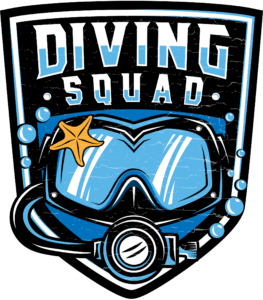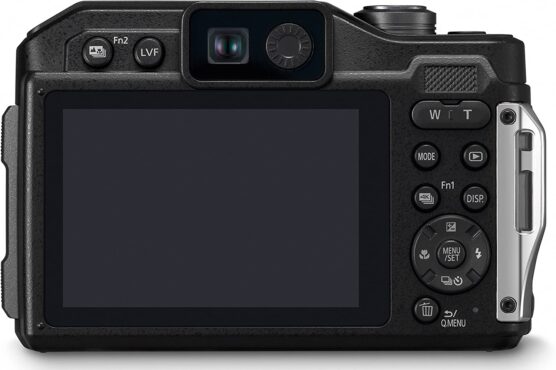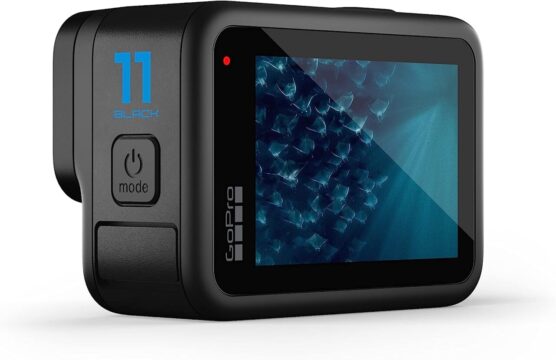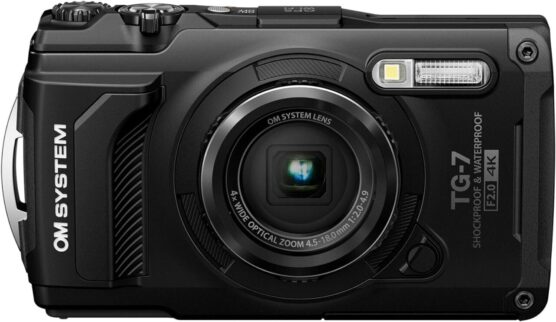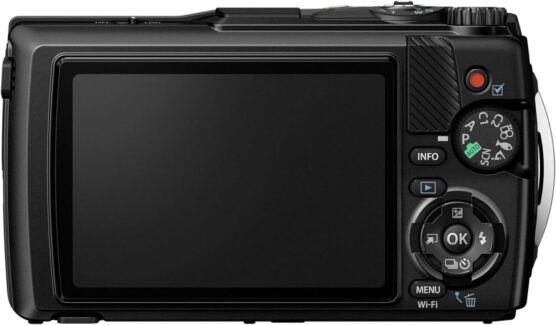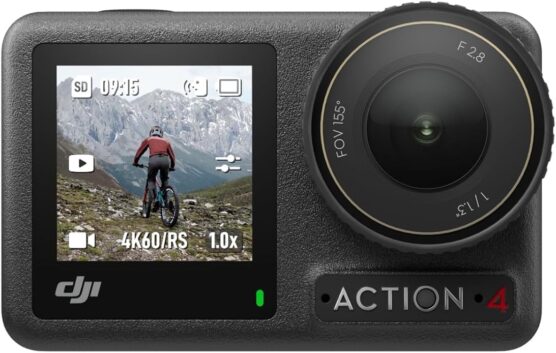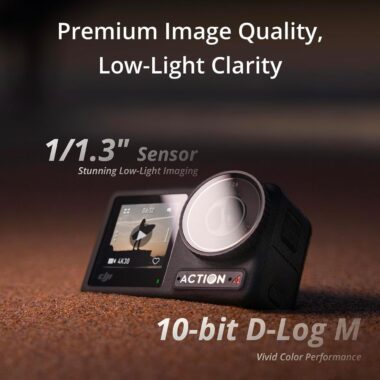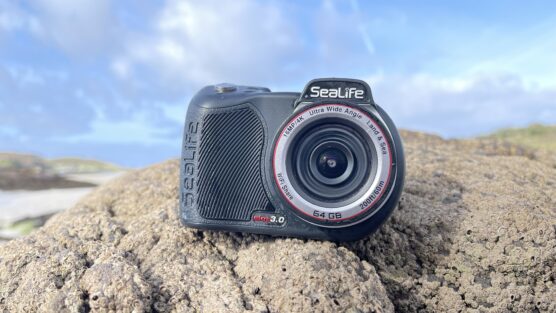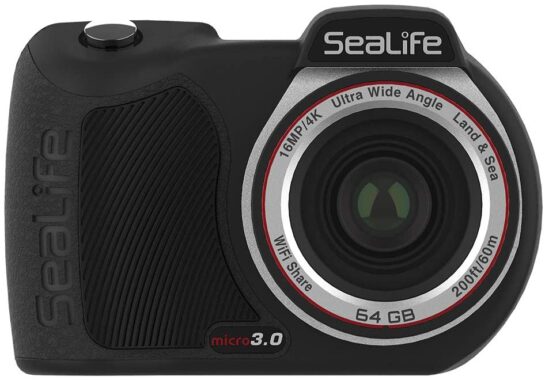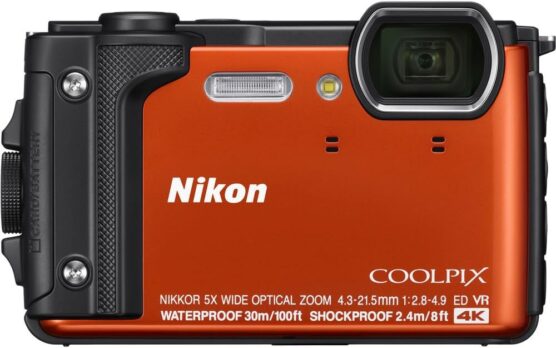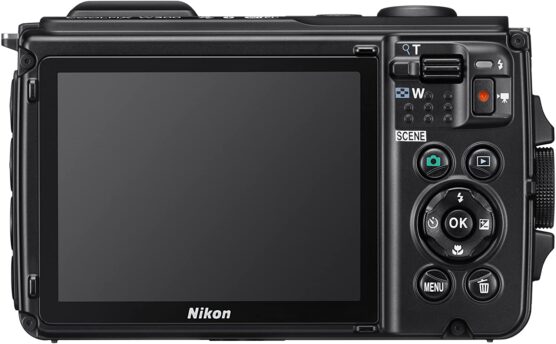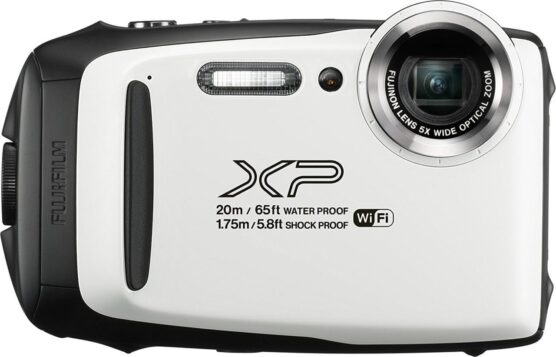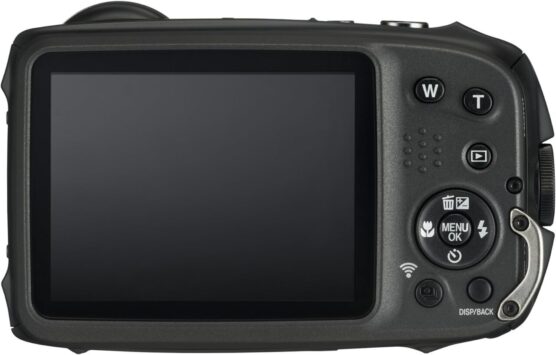
Best Underwater Camera for Snorkeling [2024 Edition]
(If you’re looking for high-end underwater cameras, check out our main page: Best Underwater Cameras)
Are you biting at the snorkel to record your marine adventures with a waterproof camera but unsure which is the right one for you?
In today’s tech savvy world, there’s a variety of different underwater cameras for snorkeling out there. However, they vary a lot in terms of price, capabilities and special features.
Some waterproof cameras are more suited for scuba diving whereas others are specifically designed for being used near the water’s surface, making them ideal for snorkelers.
In this article, we’ve reviewed the 10 best snorkelling cameras of 2024.
We’ve taken into account key factors such as the cost of each camera, it’s underwater settings, user-interface and how applicable it is to be used specifically for snorkeling.
Use the Quick Look section directly below to take a fast glance at the best underwater cameras for snorkeling – or dive down deeper to read our Detailed Reviews for each one.
Let’s do it!
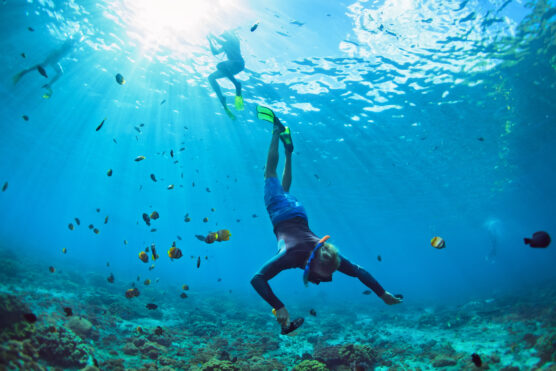
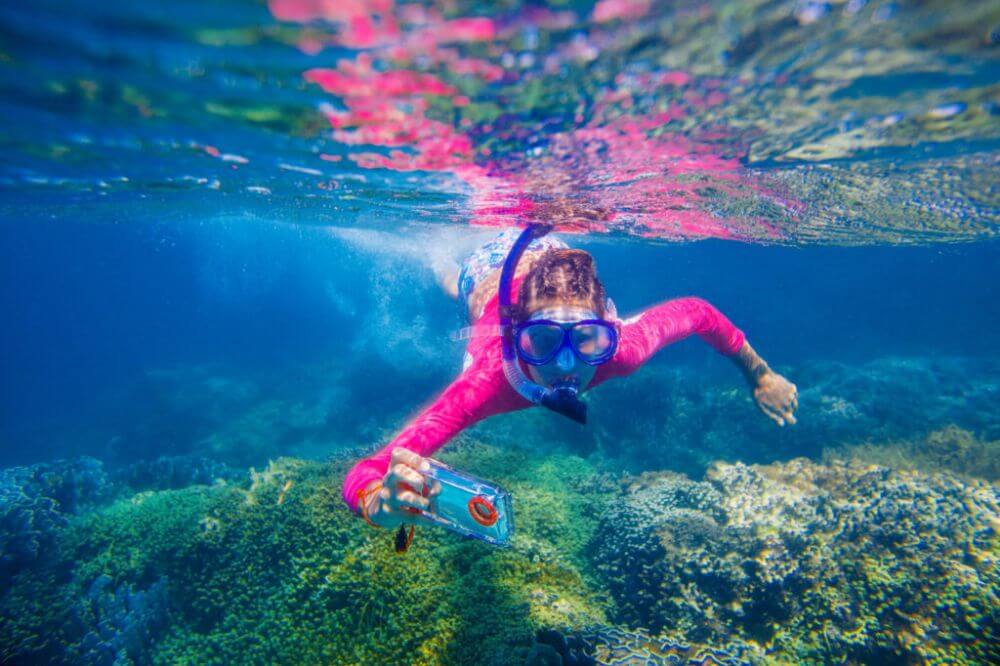
QUICK LOOK - Best Snorkeling Cameras:
1) Best Value Snorkeling Camera: Akaso V50 Elite
Good Photos: (20mp)
Great Videos (4K / 60fps)
Manual White Balance Adjustment
Includes Underwater Housing (waterproof to 131 ft)
2) Best Features for Snorkeling: Panasonic Lumix TS7
Electronic Viewfinder: easy to see at surface
4 X Optical Zoom
Good Photos (20.4mp)
Good Videos (4K / 30fps)
Waterproof to 102 ft
3) Cheapest: Hischon Waterproof Digital Camera
High Quality Photos (48mp)
Decent Video (4K)
Extra Display at Front for Selfies
Waterproof to 11 feet
4) Waterproof Case for SmartPhones
Fits most models of IPhone & Samsung Galaxy
Lets you use high quality camera of SmartPhone
Waterproof to 50 feet
5) Best Underwater Action Camera: GoPro Hero 11
Great Videos (5.3K at 60fps)
Great Photos (27 mp)
Awesome Video Stabilisation
Adjustable White Balance
Waterproof to 33ft without Housing
6) Best Underwater Macro Camera: Olympus Tough TG7
Microscope Mode & Optical Zoom
Good Video: 4K at 30 fps
Manual White Balance Adjustment
Waterproof to 50ft without housing
7) Awesome Underwater Videos: DJI Osmo Action 4
Awesome Videos: 4K / 120 fps
Automatic White Balance Adjustment
Vivid Underwater Video Setting
Waterproof to 26 feet without housing
8) Underwater Colour Correction: Sealife Micro 3.0
UW Colour Correction for Shallow & Deep
Great Videos: 4K / 30fps
Very Nice Photos: 60mp
Also fantastic for scuba diving
Many accessories available
9) Most Durable Snorkeling Camera: Nikon CoolPix W300
Drop-proof, freeze-proof, shock-proof, dust-proof
Good Videos: 4K / 30 fps
Good Photos: 16mp
5 X Optical Zoom
Waterproof to 100 feet
10) Cheapest Optical Zoom: FuijiFilm FinePix XP130
5 X Optical Zoom
OK Videos: 1080p / 60fps
Good Photos: 16mp
Waterproof to 65 feet
REVIEWS: Best Underwater Cameras for Snorkeling:
- Best Value Snorkeling Camera: Akaso V50 Elite
- Best Features for Snorkeling: Panasonic Lumix TS7
- Cheapest Waterproof Camera: Hischon Waterproof Camera
- Waterproof Case for SmartPhones: Laynos Second Generation
- Best Action Camera for Snorkelers: GoPro Hero 11
- Best Underwater Camera for Macro: Olympus Tough TG-7
- Waterproof Camera for Awesome Videos: Osmo Action 4
- Underwater Colour Correction: Sealife Micro 3.0
- Most Durable Underwater Camera: Nikon Coolpix W300
- Cheapest Optical Zoom: FuijiFilm FinePix XP130
1) Best Value Snorkeling Camera: Akaso V50 Elite
The Akaso V50 Elite is the one of the cheapest underwater cameras out there and has been an all-time best seller on amazon with rave reviews for several years.
Despite its affordability this little action camera packs a serious punch!
It can shoot awesome video HD 4K at 60 frames per second and can also take great 20mp photos. Plus it features excellent video stabilization.
With its waterproof housing, which is included in the main price, the Akaso V50 can go to to 131 ft / 40 m deep!
Just remember you can’t access the touchscreen when it’s in the waterproof casing and instead must control it via two buttons which makes settings navigation a little slower.
All the same, the user interface is simple, intuitive and easy to get used to. You can also manually adjust white balance to help with underwater colour correction.
Users can select between three view angles and there’s also an 8 X digital zoom.
In my opinion, the Akaso V50 is the best value underwater camera for snorkelling; it’s super affordable, takes really nice underwater videos and photos and is also super easy to use as well as compact to travel with.
(We have a main page on the cheapest underwater cameras!).
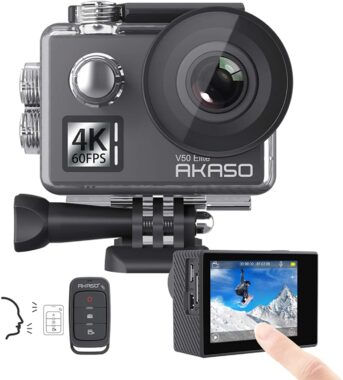
Where to Buy:
PROS:
- Awesome Videos and Photos
- High Quality Image Stabilization
- Underwater Housing included
- Easy to use
- Adjustable White Balance
CONS
- In its waterproof housing, it can only be controlled via 2 buttons, slowing up settings a little.
- Zoom is digital and so images degrade when it is applied.
- Image quality degrades in poor light
2) Best Features for Snorkeling: Panasonic DC-TS7A Lumix TS7
Waterproof to 102 feet / 31 meters, the Lumix TS7 is also drop-proof from 6.6 feet and freeze-proof to 14 degrees F. This makes it an extremely tough and durable (not to mention compact) snorkelling camera!
The Lumix TS7 makes one of the all-time best waterproof cameras for snorkeling thanks to its electronic viewfinder – which means its easy to see the image you’re trying to capture even in bright sunlight.
Just remember, an electronic viewfinder is less ideal as you go deeper underwater, so the Panasonic TS7 really does shine through as a snorkeling camera, not a diving one!
Another one of our favourite features of this waterproof camera is the 4.6 X optical zoom lens – this comes in seriously handy when you’re at the surface and notice an interesting subject some way below you in the water.
It can capture excellent quality photos with it’s 20.4 mp sensor as well as superb full 4K Video at 30 fps.
Because it doesn’t need to be placed in waterproof housing, the Lumix TS7’s full range of buttons, knobs and dials can be operated in the water, making it extremely quick and easy to control and operate.
The large, 3 inch LCD display screen makes it super easy to see the shot you’re framing and there are 22 unique filter effects that can be used! Other features include optical image stabilization, panorama and WiFi integration.
The Lumix TS7 is the best of the best waterproof cameras for snorkeling, with excellent features and durability all at a very reasonable price.
PROS:
- 4K photo feature let’s you turn 4K video frames into 8mp photos.
- Different Shooting Modes: Underwater, Beach and Surf, Sports.
- Long battery life.
- Inbuilt Compass and altimeter useful on treks.
- 20.4 mp CMOS sensor = good image quality.
- 4.6x Optical Zoom.
- Electronic Viewfinder.
CONS:
- Does not handle low light very well (usually only a problem if you try to dive with it).
- Only waterproof to 31m / 102 ft, which some deep dives go beyond. But again, this is a snorkeling camera!
3) Cheapest: Hicschon Waterproof Digital Camera
The all-time cheapest underwater camera on this page, the Hischon Waterproof Digital Camera costs even less than the Akaso V50.
Unlike other cameras on this page, which can also be taken diving, the Hischon has been designed exclusively for snorkelling, as it is only waterproof to 11 feet.
To be honest; we don’t mind this because in many other regards it’s a surprisingly high quality camera.
For starters, it takes very good photos at an astonishing 48 mp quality and decent 4K video as well.
Unlike most waterproof cameras, there’s two displays; one at the back and one at the front; making it easy to take selfies.
Lightweight and compact; this is a great travel camera and because it’s so cheap if it does get broken or lost, it’s no major biggy. It also includes a small drawstring bag as well as a cleaning towel and a micro SD card.
User reviews indicate that despite it’s low cost; this camera is a little complicated to use; so it’s a good idea to spend a couple of hours trying out the settings and operating modes before you take it snorkeling.
Also, whilst the LCD screen at the back is a good size at 2.8 inches wide; some users indicated it can be hard to make out underwater in poor lighting.
Still, for the incredibly low price it comes at, the Hiscon Waterproof Digital Camera is a great budget-option for anyone seeking an expendable holiday camera to snap awesome photos whilst snorkeling.
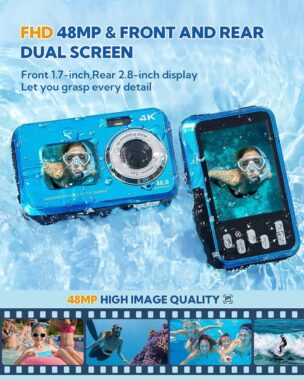
Where to Buy:
PROS:
- Ultra Cheap
- High Quality Photos
- Good Videos
- Extra Display at Front for Selfies
- Compact and Light
CONS
- Only waterproof to 11ft – suitable for snorkeling but not diving
- A little complex to use
- Can’t always make out back display in poor lighting
4) Waterproof Case for Smart-Phones: Laynos Second Generation Black
Ok, so whilst 3) the Hischon Waterproof Cam is the cheapest camera, you can actually spend even less if you already have a smartphone by simply buying a cheap waterproof case to put it in.
The advantage to this, besides saving money; is that these days smartphones have extremely high quality cameras; capable of taking better photos and videos than many actual cameras can.
As well as this, there’s countless apps available to help you shoot and edit videos; several of which are tailored especially towards colour correction for underwater photo and videos. Nice!
The Laynos Second generation Black smartphone waterproof casing, it let’s you safely take your beloved phone to 50 ft / 15m and also features an anti-shock corners and an anti-scratch screen protector.
Sensitive and flexible buttons allow you to easily operate your phone through the case. This is one of the most highly rated yet affordable waterproof casings for smartphones currently on the market.
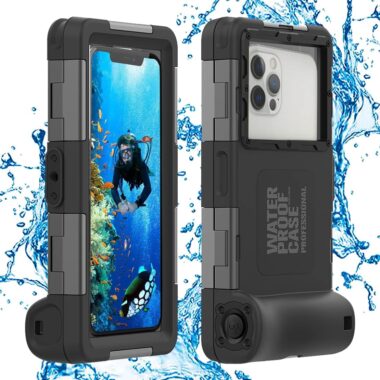
Where to Buy:
PROS:
- Super Affordable
- Let’s you use High Quality Camera of your SmartPhone
- Many apps for shooting underwater available
- Anti-Shock and Anti-Scratch
CONS
- No actual camera – so you need a smartphone for this to work!
5) Best Action Camera for Snorkelers: GoPro Hero 11
Action cameras are small, digital cams that have been designed to record action, usually from the shooters point of view. They’re great for activities like surfing, biking, diving and yep, you’ve guessed it: snorkeling!
Without a doubt, the highest quality action cam currently available is the GoPro Hero 11, it’s the only waterproof camera that can capture 5.3k / 60fps video!
It also has a huge 27mp sensor for snapping incredibly detailed photos as well as Hypersmooth 5.0 which is the best video stabilisation tech of any underwater camera, period!
You can manually adjust the white balance and ISO settings above water and store these setups as custom presets that can be accessed underwater – with the appropriate settings this allows for awesome underwater colour correction.
There is also an extra display on the front which is perfect for taking selfies. Even without its seperatley purchased underwater housing, it is waterproof to 33ft.
GoPro are a legendary name in the action camera sphere – and the Hero 11 is one of their latest models. Despite the incredible features that it boasts, this is actually one of the cheapest waterproof cameras on our list!
PROS:
- Shoots 5.3 K full HD video = superb video quality
- 2 LCD screens – one on back, one on front for selfies
- 27 mp sensor = very decent picture quality (20mp photos)
- Hyper Smooth 5.0 blast: excellent video stabilization
CONS:
- For underwater colour correction have to manually adjust white balance
(We’ve written a separate article going into full detail on underwater action cameras).
6) Best Underwater Camera for Macro: Olympus Tough TG-7
The Olympus TG-7 is quite similar to the Panasonic TS7: it can shoot 4k video at 30fps, has a 4 x optical zoom and is waterproof, meaning that all of it’s buttons and dials can be accessed underwater, allowing for easy control.
Straight out of the box, it can be taken to 15m / 50ft deep underwater and if you get it’s separate underwater housing, then it can go to 45m / 147 ft – although that’ll only be needed if you plan to scuba dive with it!
The Olympus TG-7 uses an LCD viewfinder – which performs well at depth, as a posse to the Panasonic TS7’s electronic viewfinder, which works better at the surface. (We wrote a separate article on dive cams here).
The Olympus Tough TG-7 is a truly excellent camera for shooting macro (small critters like shrimp or tiny seahorses) as it can focus on subjects as close as 10cm and also features a built in macro mode.
It does only have a 12 mp sensor, which means that photos aren’t going to be as crisp as those taken by the Panasonic Lumix TS7, however the Tough TG-7 makes up for this by having RAW support and adjustable white balance.
This is a seriously easy to use camera and is actually a little cheaper than the Lumix TS7 despite having the several advantages it has over it.
It’s an extremely popular option among beginners and those who want to do a mix of snorkeling and diving.
PROS:
- Video Stabilisation
- Macro Mode
- 4 X Optical Zoom
- Auto Mode
- Easy to Use
- RAW Support
- Adjustable White Balance
CONS:
- Image quality is not as detailed as some other options due to 12mp sensor.
7) Awesome Videos: DJI Osmo Action 4
The DJI Osmo Action 4 is budget-friendly, compact and well…not very well heard of. But it’s an underwater video shooting machine able to shoot 4K video at an impressive 120fps and with a number of special features.
First, it has a colour temperature sensor that automatically adjusts white balance to give more realistic colours underwater; no matter what the light level.
There is also a “Vivid Underwater Setting” which syncs visual info from the colour temperature sensor for awesome underwater video detail by making video image clearer and more defined.
The result is extremely realistic underwater colour correction with no user-effort required. That said you can also manually adjust white balance if you want.
A front display makes it easy to take selfies; especially when used in tandem with the separately purchased selfie-stick. Plus there are 3 video stabilization modes: Rock Steady, Horizon Steady and Horizon Balancing.
This is a really nice waterproof camera for snorkeling; it is waterproof to 26 feet / 18 meters without any underwater housing. Durable, compact and easy to use it offers awesome value for money.
DJI have a reputation for manufacturing awesome gimbles and drone’s. They’r relatively new entrees into the action camera scene but so far they’re already making a big splash with rave reviews from users.
PROS:
- High Quality 4K video at 120 fps
- Automatic colour temperature adjustment
- Vivid Underwater Mode
- Waterproof to 26 ft without casing
- Affordable
CONS:
- No Macro Mode
- Photo quality not as good as video quality
8) Underwater Colour Correction: Sealife Micro 3.0
The Sealife Micro 3.0 is mainly designed for scuba diving but it also makes an excellent snorkeling camera. It comes in a fully sealed waterproof housing that makes it waterproof to 196 ft / 60 m.
Snapping crisp 16mp photos and great 4K Videos at 60 fps it’s an awesome all-rounder for which there’s a number of separately purchased accessories such as macro lenses and underwater lighting.
This is an exceptionally easy to use camera with a simple user interface, a large display that’s easy to see underwater and the ability to rapidly upload photos and videos on to your mac / computer via the USB charging cable.
As well as being compact; it’s suitably durable; with a shock-proof and drop-proof rubber casing making it a great option for travel.
What really makes the Sealife Micro 3.0 stand out is the automatic white balance adjustment for realistic underwater colours. It has a diving and a shallow mode for this; the latter being perfect for snorkeling.
These two modes are quick and easy to switch between underwater via the large piano-key style buttons. Colours come out incredibly realistic. Battery life is very decent at up to 3 hours.
Overall, this is an awesome waterproof camera for snorkeling; it’s a little more expensive than some other options but besides the underwater colour correction another advantage is that it’s also great for diving.
PROS:
- All-Rounder: Awesome 16mp Photos and 4K 60fps Video
- Underwater Colour Correction: 2 Modes: Shallow & Deep
- Easy to Use
- Many Accessories available
- Also great for Diving
CONS:
- A little more expensive than most other options
9) Most Durable Snorkeling Camera: Nikon Coolpix W300
Drop-proof to 7.9 ft, freeze-proof to 14 degrees, dustproof and waterproof to 100ft / 30m, the Nikon Coolpix W300 is the most tough as nails snorkeling camera out there. You’ll be hard pushed to break it.
Besides its nigh invincibility and lightweight, compact build that make it ideal for travel, this is a high performing camera – it can snap 16mp photos and record full HD 4K video at 30 fps.
Users can select from a number of shooting modes including underwater, beach, close up, snow and sport amongst others. The 5x optical zoom let’s you get closer to subjects with plenty of added detail.
Other great features include vibration reduction for smooth footage, WiFi integration as well as AE lock in when shooting underwater video.
An extra large grip and smart button placement make for stable one handed shooting whilst the 3 inch LCD screen is anti-reflective coated, which helps when shooting in bright light, i.e. near the surface.
There is a dedicated tool button that gives quick access to GPS, e-compass and other tools, plus depth is displayed on the lcd screen.
The Nikon Coolpix W300 is a seriously cool all rounder and in many ways feels like a blend of the Panasonic TS7 and the Tough TG 7, although it’s a little cheaper than both.
With many raves reviews, this has also got to be one of the most popular snorkel cameras currently trending the market.
PROS:
- 2 autofocus modes for video shooting.
- Extremely durable.
- Compact camera.
- Inexpensive.
- LCD screen is coated with anti-reflective.
- AE lock in when shooting underwater is possible.
- Vibration reduction / video stabilization.
- 5x optical zoom!
CONS:
- Expensive
- Battery life is quite short – 1 hour video recording at 1080p and less for 4k.
- Video recording time limited to 29 minutes or when file size limit is reached.
10) Cheapest Optical Zoom Option: Fuijifilm FinePix XP130
The Fuijifilm FinePix XP130 is the cheapest waterproof camera with an optical zoom which can be magnified 5 times.
What makes an optical zoom special is that it works like an actual magnifying glass thereby providing more real detail – whereas a digital zoom as seen in most cameras is simply a glorified crop.
The downside of this waterproof camera is that it’s video quality is not quite as high as other options; being only able to shoot at 1080p / 60fps. Still, for photos, it has a 16.4 mp sensor which is pretty good and snaps decent quality images.
The Fuijifilm Finepix XP140 is waterproof to 65 ft / 20 m, which is not only more than enough for snorkeling; it also means it can be taken on shallow scuba dives.
It uses a fixed lcd viewfinder paired with a wide angle lens to present high quality images and is also nicely complimented by a CMOS-sift optical image stabilisation that controls camera shake and minimises blur.
If your’e looking for a cheap waterproof camera with optical zoom capabilities, the Fuijifilm FinePix XP130 is a great option. The fact that it’s shockproof to 5.8 feet as well as freezeproof and super compact also makes it great for travel.
PROS:
- 5 X Optical Zoom
- Cheap
- Durable
- Decent Photos
CONS:
- At 1080p video resolution is lower than that of other waterproof cameras
- No automatic underwater colour correction
Buyer's Guide: What makes a great Snorkeling Camera?
First and foremost a good snorkeling camera must be fully waterproof. Ideally it should be waterproof without needing to be placed in underwater casing, which can limit access to some buttons, thereby slowing up controls.
That’s why 5 of the 6 snorkeling cameras we’ve reviewed (all but the cheapest option, the Akaso V50 Elite), can be operated underwater without any underwater casing.
Snorkeling cams should also be durable and compact and they shouldn’t cost too much money either as they’re usually orientated towards hobbyists. Once again, only models that meet these standards have been presented.
A good snorkel camera should have decent filming and photo specs – it ought to be able to at least film 4K and take 12 mp photos, which all of the cams on this page are capable of doing.
All the same, I’m going to be honest with you about something. Waterproof cams that are orientated towards snorkelers can take some very respectable video footage but the photos they snap will usually be of poorer quality than what your smartphone would take.
However – because waterproof cameras are both sturdier and cheaper than smartphones, they’re far more appropriate to risk at sea.
(But if you’re really serious about getting a high quality waterproof camera and you don’t mind forking out a lot of cash, check out our main page on dive cameras).
Because snorkelers usually stay at the surface, it’s extremely useful for a snorkeling camera to have a zoom, because that way you can get a closer shot of something that’s below without having to swim down closer to it.
Every camera in this article comes equipped with a zoom – the Akaso Elite V50 and GoPro Hero 9 have digital zooms which are pretty handy; sort of like a close up crop, however the other four snorkeling cams all have optical zooms, which are even better as they give extra detail when applied.
It’s also useful for a snorkeling camera to have image stabilisation tech as this counters for shaky video footage and makes it less blurry – once more, all the cams featured on this page have video stabilisation.
Finally, when a camera is equipped with an electronic viewfinder, it’s slightly easier to see the shot you’re framing in bright light – which a snorkeler is likely to experience, due to being at the surface.
Because of this, our favourite snorkeling camera of all time is the Panasonic Lumix TS7, as in addition to having an optical zoom, video stabilisation, macro mode, being sturdy and waterproof without casing to 30m, it has an electronic viewfinder, so it’s easy to see what you’re doing even if the sun is out in full force!
The other cams rely on traditional lcd viewfinders, which can still be used at the surface and unlike the electronic viewfinder are better to use in low lighting, meaning they’ll actually be better for greater water depth / diving – but they still make excellent snorkeling cams as well.
Among them, is our second favourite snorkel camera: the Olympus Tough TG 6!
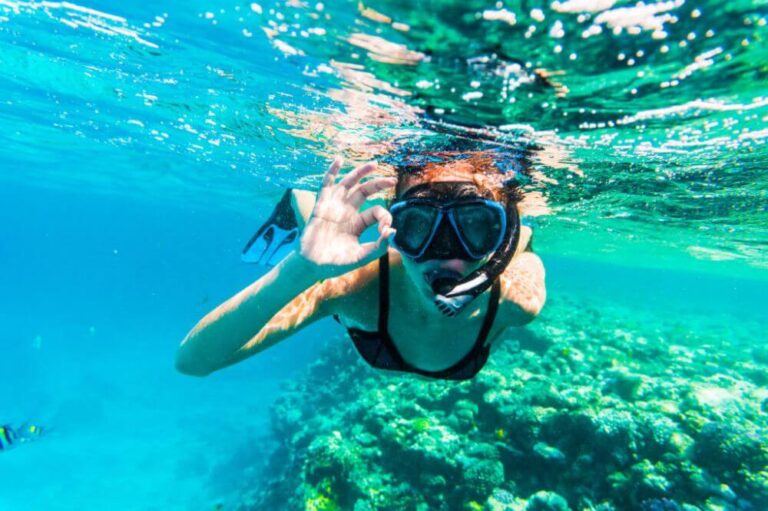
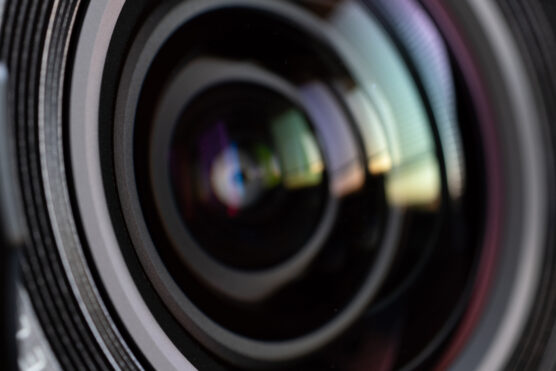
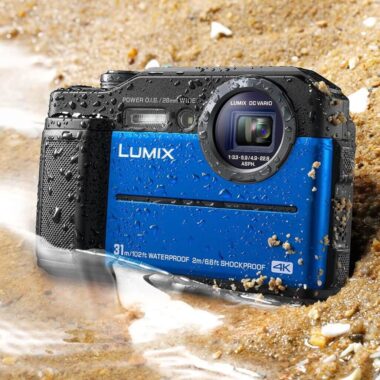
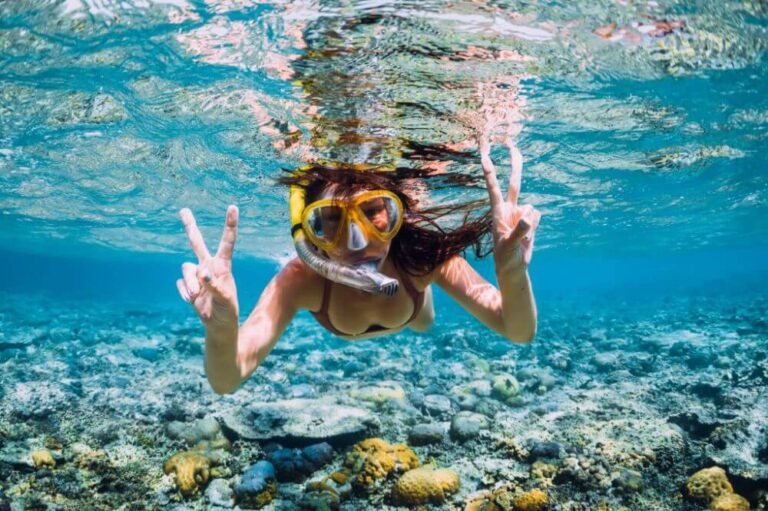
Terminology Glossary:
1) Viewfinder
This is the camera component that shows you the area of the subject that will be included in the shot.
Generally speaking, most digital cameras are built with optical viewfinders or prominent liquid-crystal display (LCD) preview screens that can be used as convenient viewfinders in casual photography. This is the case for all the cameras we’ve reviewed, except for the Panasonic Lumix TS7, which uses an electronic viewfinder.
An electronic viewfinder is a separate LCD that accurately reproduces the images gathered through the lens and also displays essential camera settings, whilst also showing exposure levels.
It’s quite a bit easier to see things on an electronic viewfinder even when bright light would wash out a standard lcd display screen, so you get a better idea of how the shot will turn out.
2) Underwater / Waterproof - Casing / Housing
When we refer to underwater housing we’re talking about the protective outer casing that some cameras must be placed in, either to allow them to be placed in the water; or if they’re already waterproof, so that they can be taken to greater depths.
Underwater casing can restrict access to most of a cameras buttons though, so it can slow up navigating through settings. Of the six snorkeling cameras we’ve reviewed only the cheapest one, the Aksao V50 Elite has to be placed in underwater casing. All of the rest are waterproof at snorkelling depths.
3) Action Camera
A compact and generally low cost camera that’s been designed for shooting action, whilst being in the midst of it, usually from the point of view of the shooter. They’re very popular sports and adventure activity cameras and can also make great underwater cameras.
Most are packed with a range of accessories such as a wrist strap, remote control and accessories to let you attach the camera to helmets, etc. They also include underwater housing, which they must be placed in for snorkeling and diving.
4) Zoom
Digital zoom is like a specialised image crop – it makes a subject bigger, but it doesn’t actually provide any more detail. The Akaso Elite V50 and GoPro Hero 11 feature digital zooms.
Optical zoom is more like the real deal, because as it’s applied it does actually provide greater detail within the image. The Panasonic Lumix TS7, Tough TG 6, Nikon W300 and Fuijifilm Finepix XP130 all feature optical zooms.
5) 4K Video
6) MP Sensor
A megapixel (mp) is a million pixels – the term not only used for the number of pixels in an image but also for the number of image sensor elements.
The more megapixels a camera has in it’s mp sensor, the more detail it can capture in an image. So a 16 mp sensor can capture a more detailed image than a 12 mp sensor.
7) FPS
FPS stands for frames per second and it refers to how many video frames a camera can capture per second. The higher the fp, the the higher the quality of video footage. So if a camera’s max video capability is 4K at 60fps, this is better than 4K at 30fps!
8) Image Stabilization
This refers to gyro, EIS, algorithm or other technology installed in a camera, which is able to counter for and correct shaky video footage, with the effect also being referred to as video stabilsation. We’ve only reviewed snorkeling cams that have this awesome feature.
9) Drop-proof
This is a good indication of how durable a camera will be. A drop-proof rating of 7 ft indicates that the camera can withstand the force of being dropped from seven feet without breaking. This is more impressive than a drop-proof rating of 5ft, which would indicate a less sturdy cam. All these snorkeling cameras are durable and compact!
10) Battery Life
Refers how long the camera can keep running on a single full charge of battery. Shooting in higher video resolution will use up more battery than shooting in lower resolution.
11) Video Resolution
Video resolution refers to the number of pixels displayed on the screen: more pixels means a higher video resolution = a better quality image.
Video resolution level is usually described according to the width of how many pixels can be fit within each dimension – for example with 1080p video resolution there are 1080 pixels in the width, whereas for 4K resolution there is almost 4000 pixels in the width – meaning you get almost four times the detail.
Although higher video resolution does provide more detail, as a camera reaches it’s maximum video resolution capabilities it is not able to film at as a high a frame rate as it could for lower video resolutions. Also, shooting in higher video resolution gets through battery life much faster.
Tip for first time Underwater Photographers / Videographers:
When shooting videos or snapping photos of subjects that are underwater, there’s a few important rules to remember to make sure that the image turns out well.
We’re talking essential stuff here: such as white balance, RAW settings and underwater filters to name a few. To find out more, take a glance at this informative article: Underwater Photography Tips for Beginners.
Diving Squad Debriefing
Splash! You’ve just finished our article on the best snorkeling cameras of 2024…how do you feel? You should feel as if every cell within your body is pulsating with in-depth knowledge of what makes a great snorkeling camera and which model is going to be the absolute best one for you!
Eh…if you don’t feel that way, maybe read the article a couple more times or if you ain’t got no more time, just take our word for it: right now the Panasonic Lumix TS7 is the best snorkeling camera out there.
Also, you can rest easy in the knowledge that we are constantly on the prowl to stay in the know how of the very best scuba gear drifting through the market. We constantly update and add to our content so know that what you’ve read today reflects the very latest knowledge on the best snorkeling cameras currently available. Trust us ;).
And if a dive camera is more what you seek, do check our main page on the best scuba cameras.
That’s all for now folks. Diving Squad Out!
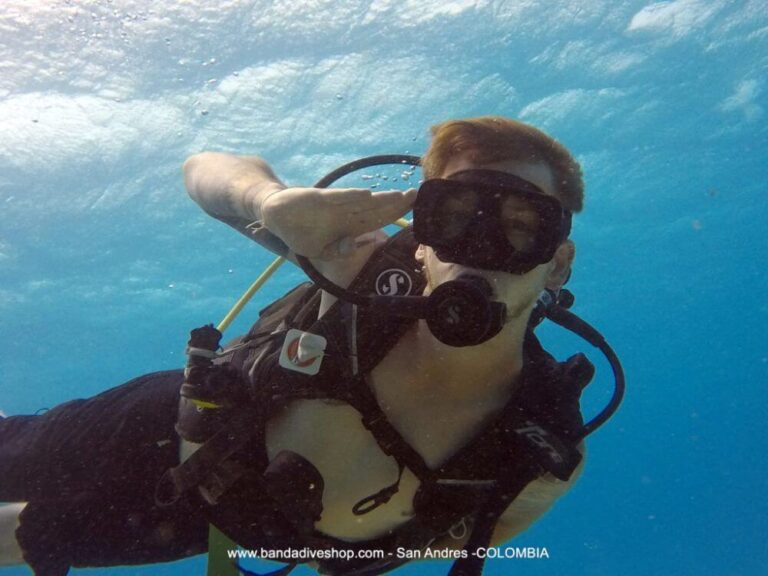
Support the Squad!
We are part of the Amazon Services LLC Associate Program. If you make a purchase on amazon after clicking a link on Diving Squad, we earn a small commission fee, at no extra cost to yourself.
We are also part of several other affiliate programs so if you click on a Diving Squad affiliate link that results in you booking a liveaboard, booking accommodation, purchasing insurance or buying a product somewhere else, once more we make a small commission, without it costing you a cent extra. Thanks!
Written by:
Alex
